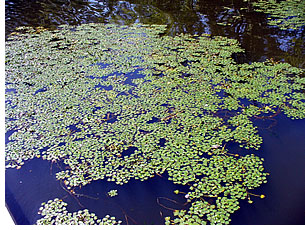Mystic River Water Chestnut Pull June 12
 Water chestnuts have been flourishing on the Mystic River. Their dense canopy of leaves harms the river’s health and impedes navigation. Photo courtesy Mystic River Watershed Association.
Water chestnuts have been flourishing on the Mystic River. Their dense canopy of leaves harms the river’s health and impedes navigation. Photo courtesy Mystic River Watershed Association.
Seven local organizations are teaming up to tackle a growing problem in the Mystic River: the European water chestnut plant.
The water chestnut, one of the most invasive aquatic plants in the northeastern United States, is flourishing in the Mystic. It forms a dense canopy of leaves floating on the water surface, compromising the river’s health by reducing sunlight penetration and depleting oxygen levels. The plant also impedes recreational activities.
Groundwork Somerville, in collaboration with the Mystic River Watershed Association (MyRWA) and the Friends of the Mystic River, is leading a multi-year effort to rid the Mystic of the water chestnut, starting with a community hand pulling event on Saturday, June 12.
“Water chestnut thrives in slow-moving, shallow water such as in the Mystic River,†said Patrick Herron, Water Quality Monitoring Director for MyRWA. “The fast growth rate of the water chestnut and the high nutrient concentrations in the Mystic are leading to large populations of the plant.â€
A MyRWA survey last year showed the water chestnuts covering almost 8 acres of the river in Medford and Somerville. That prompted the organizations to partner and create a plan of action. In addition to extensive hand pulling, the strategy calls for large-scale mechanical harvesting in the most affected areas.
“The Friends of the Mystic River has been hand pulling the water chestnuts in Medford since 2002, but for all our efforts, we only manage to inch downstream,†said Mary Werowinski, president of the Friends. “This larger joint effort is most welcomed by everyone concerned and it will make an enormous difference in improving the health of the river.â€
In addition to these organizations, various other groups are participating, including the Riverside, Wellington, Winter Hill and Medford boat clubs, which also have provided funding to get the project started. Groundwork Somerville is also working with a team of AmeriCorps NCCC (National Civilian Community Corps) members to work on the water chestnut issues this spring, and hopes to hire a team of young employees to pull chestnuts this summer.
“Our environmental challenges cannot be solved without looking outside of our municipal boundaries. We need to follow the lead of organizations such as the Friends and MyRWA, who have focused their work on rivers and watersheds,†said Groundwork Somerville Executive Director Jennifer Lawrence.
Community volunteers are invited to participate in the hand pulling event, which will take place from 9 a.m. to noon on June 12. Pulling will be done from canoes, kayaks and small boats. The water chestnuts are placed in laundry baskets or recycling bins, then transferred to a boat for collection onshore, where they will be hauled away for composting.
If you have a boat, the meeting place will be in Medford at the intersection of South Street and Curtis Street, just east of the Winthrop Street bridge. RSVP through the Friends of the Mystic River at 781-391-2604, or by email mystic02155@hotmail.com.
A limited number of canoes will be available, so if you need a boat, an RSVP is required through the Watershed Association at 781-316-3438 or contact@mysticriver.org.
Pulling will take place near the John D. Hand Memorial pedestrian bridge in Medford Square and other nearby areas of high water chestnut concentration.
All boaters are required to wear a life preserver or personal flotation device. Volunteers under age 18 are not allowed to paddle without a parent present. Volunteers are also needed to work onshore, transferring the water chestnuts for disposal.
Following the pull, the Riverside Yacht Club, 52 Ship Ave., Medford, will host a barbecue to thank volunteers and celebrate the kickoff of developing efforts to solve the water chestnut problem.
“Addressing the invasion of water chestnut into the Mystic River Watershed is a high priority for MyRWA and we are excited to join with our community partners to solve this serious problem,†said EkOngKar Singh Khalsa, Executive Director. “As has been found in other watersheds, ridding the Mystic of this extremely aggressive exotic plant will require a continuous, dedicated effort over several years. MyRWA is committed to the task and with so many others having stepped up to be a part of this effort, we are confident we will be successful.â€
– Submitted by Ken Krause, Friends of the Mystic River